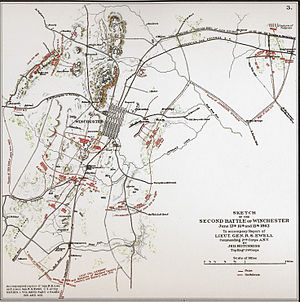Battle of Winchester II
| Second Battle of Winchester | |||||||
|---|---|---|---|---|---|---|---|
| Part of the American Civil War | |||||||
 Sketch of the Second Battle of Winchester, by Jedediah Hotchkiss. |
|||||||
|
|||||||
| Belligerents | |||||||
|
|
|
||||||
| Commanders and leaders | |||||||
| Robert H. Milroy | Richard S. Ewell | ||||||
| Units involved | |||||||
| 2nd Division, VIII Corps | Second Corps, Army of Northern Virginia | ||||||
| Strength | |||||||
| 7,000 | 12,500 | ||||||
| Casualties and losses | |||||||
|
4,443
(95 killed
348 wounded 4,000 missing or captured) |
269
(47 killed
219 wounded 3 missing) |
||||||
The Second Battle of Winchester was fought between June 13 and June 15, 1863 in Frederick County and Winchester, Virginia as part of the Gettysburg Campaign during the American Civil War. As Confederate Lieutenant General Richard S. Ewell moved down the Shenandoah Valley in the direction of Pennsylvania, his corps defeated the Union Army garrison commanded by Major General Robert H. Milroy, capturing Winchester and numerous Union prisoners.
After the Battle of Brandy Station, June 9, 1863, Confederate General Robert E. Lee ordered Ewell's 19,000-man Second Corps, Army of Northern Virginia, to clear the lower Shenandoah Valley of Union opposition so that Lee's army could proceed on its invasion of Pennsylvania, shielded by the Blue Ridge Mountains from Union interference.
Union General-in-chief Henry Wager Halleck expressed great concerns about the Middle Department's defensive strategy for its primary objective of protecting the Baltimore and Ohio Railroad corridor. Brig. Gen. Benjamin Franklin Kelley, commander of the "railroad division" (Department of Harper's Ferry), had been advised that his plan along with Maj. Gen. Milroy's and Maj. Gen. Robert C. Schenck's (Commander of the Middle Department) was unsound:
...
Wikipedia
